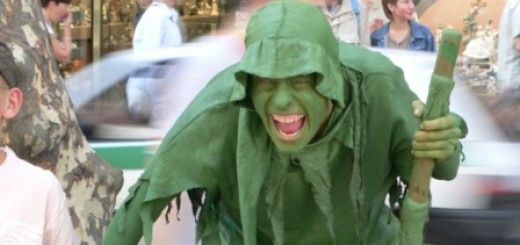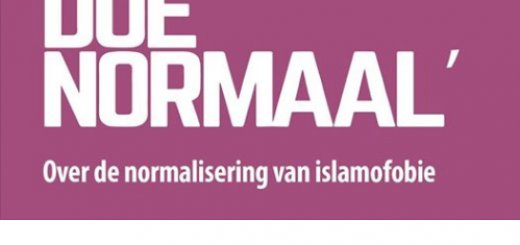Black Hole Islamophobia – Trojan Horses and Sharia-Triangles
In the podcast series The Trojan Horse Affair, the hosts Hamza Syed and Brian Reed meticulously investigate how the Trojan Horse Affair came about, how it unfolded and what the consequences were. They do not just tell us that it was a stigmatising affair, involving a number of political stakeholders who had no real concern about the consequences for Muslim communities, neither do they simply describe the behaviour of politicians and others who seized upon it as an opportunity to further their own agendas – they show it. And they show it to great effect.
The Trojan Hoax
The Trojan Horse Affair, for readers who may not have heard of it, emerged after an anonymous letter arrived at Birmingham City Council in late 2013. The letter claimed there was a conspiracy by islamists to takeover the Birmingham schools. The letter made national headlines after being leaked to journalists in 2014, but it also made a few headlines outside the UK on several far-right Islamophobic blogs, for example, and in Dutch newspapers. On the 25th of March 2017, the popular Dutch daily newspaper De Telegraaf reported on the city of Birmingham using the headline: ‘Birmingham as Terror City’ and referred to Birmingham as ‘Terror Central’, stating that 18% of the crimes in Birmingham were committed by Muslims, according to a report compiled by the Henry Jackson Foundation, “a conservative think tank”. (What is referred to here is the Henry Jackson Society, described by Tom Griffin, Hilary Aked, David Miller and Sarah Marusek as “the leading exponent of neoconservatism in the UK today grounded in a transatlantic tradition deeply influenced by Islamophobia and an open embrace of the ‘War on Terror’.”
The Telegraaf also noted:
“The city is also known because of the ‘Trojan Horse Conspiracy’. That was a plan by radical Muslims to infiltrate the school boards in the city in order to push the curriculum into the direction they desired. It involved ‘a long and coordinated’ agenda to radicalise school children in a very strict Sunni way. The programme reached 5000 school children. Authorities looked the other way for a long time, but after whistle blowers called it out, action followed suit. Teachers were fired and schools placed under supervision.”
The Nederlands Dagblad (a conservative Christian newspaper) also mentioned it in November 2014 and stated that “Gove, who feared for the radicalisation of the pupils, ordered terrorism expert Peter Clarke to investigate the matter.” (Gove was, at the time, the UK Education Secretary and a Conservative Party member). The Dutch daily newspaper Trouw, in June 2014, published the most cautious response: “Madrassa-culture or witch hunt?” and was the only paper to mention that the letter was considered false and that all kinds of measures were planned to follow anyway. Despite this statement the headline still draws you into a very culturising viewpoint.
When I was in Birmingham, Manchester and Leicester for research in the Summer of 2014, a lot of people brought the letter up in conversations and doubted its veracity. The Trojan Horse Affair podcast allows you, as it were, to actually listen to the story of the letter and follow its demise, to realise how little people really cared and to learn how easy it was to get an idea of who was behind the letter. And, more significantly, to grasp the fact that no one was ever taken to account for their actions and inactions.
The Trojan Horse Affair as a black hole
As the podcast series makes clear, the whole affair gave rise to a spectacle of ‘creeping Islamisation’, mysterious underground networks of Muslims colluding to takeover society and terrorist monsters planning to undermine UK society. No plot was ever found, none of the problems mentioned had anything to do with political violence. The investigation that followed yielded no answers, no one was clearly and officially accused of anything (despite the same groups/people being unofficially accused of everything) and no one was exonerated or vindicated. The investigation was, in fact: “its own magnificent, enraging shambles.” And, in the end what was left was a whole big nothing.
In the world of Islamophobia there are many stories about Muslims who act against society’s best interests or who commit deeds that are regarded as threatening an idealized version of the dominant culture. But when these stories are scrutinised, they rapidly fall apart to such an extent that all that is actually left of them (or at least what few details can be verified) are their effects. Collectively I call these stories Black Hole Islamophobia. This refers to stories which, for whatever reason, seem to be so compelling, connect so easily to other narratives and so conveniently dovetail into, and support, particular policies and political agendas, that all eyes are turned towards them and people feel they have to respond. But these responses are often not a reaction to the original story or a critical analysis of it, but they are responses to larger themes and tropes which the story plays on and which legitimise the taking of extraordinary measures. After a while no one appears to really care about the original story anymore but its effects remain visible. Allow me to explain this in a little more detail by giving an example from the Netherlands.
The Sharia-Triangle
One could actually point to many examples. There is a story about Moroccan-Dutch youth celebrating 9/11 on the evening of 11 September 2001 which the local police announced at the time but were later forced to retract and apologise for. Nevertheless, it was repeated again and again and still keeps coming back if only to be refuted. Another one is the story of a bus driver who was attacked in a migrant area of Gouda by a Moroccan-Dutch young man. An incident did take place, but not in that area, not by a Moroccan-Dutch young man from that city and not by a Moroccan-Dutch young man at all. But a huge public debate still took place about the lack of integration of Moroccan-Dutch youth and the city was given a lot of money to implement programmes for Moroccan-Dutch young people. The most astounding example though is probably the Sharia Triangle Affair.
In May 2013 the Dutch daily newspaper Trouw published a lead article called “Neighbourhood in The Hague is domain of orthodox Muslims”. According to the author of the article, a particular district within the Schilderswijk area was developing into an enclave of orthodox Muslims prepared to impose their own rules on others on the street. The author called the area the Forgotten Triangle, the Sharia Triangle or the Point of the Sword. It was an area, “a small caliphate”, in which a mini sharia was established. This was elaborated upon further in a second article “When your neighbourhood changes into a ‘small caliphate” which listed numerous examples evidencing a takeover by orthodox Muslims of this “Muslim enclave” and the retreat of the Dutch state and local government. This area already had a questionable reputation as a hotbed of Salafism and radicalism and contained a large group of young men who were among the first and very vocal contingent of Dutch war volunteers in Syria.
Even though the article was based upon anonymous and unverifiable sources, the outcry was huge. Far-right leader Wilders launched a plea for a constitutional ban on sharia and a ban on immigrants from “Muslim countries.” Wilders and the Minister of Social Affairs, Asscher, visited the areas and voiced their concern and indignation and, in September 2013, a large debate was held in parliament about the matter of the Sharia-Triangle. By then this so-called Sharia-Triangle had been connected with jihadism, Salafism, parallel societies, lack of integration, antisemitism, migration bans, women who needed saving and grand replacement myths, even though local authorities, civil society organisations and youth workers denied the existence of such areas. Or more precisely: “We have no indications there is a form of Sharia police here. That is not to say it does not happen, but we are unaware of it.”
Contrary to the Trojan Horse Affair, the source of the Sharia Triangle story was verified beyond a doubt; it was the journalist who wrote the article. He invented the whole story and its sources. Indeed, it appeared that, throughout 2014 and 2015, he invented many other stories as well, often deliberately playing into some of the current moral panics. The newspaper was forced to apologize and retracted the stories.
“…it exists, nevertheless”
And then the following happened. I was at a local meeting in 2015 when I replied to a Sharia-Triangle like story from a politician, saying that it was time we moved beyond that particular frame. His response was: “Yes, the story was fake. But you cannot deny that there are problems in this city with orthodox Islam. And we need to discuss that.” In a column in a national newspaper a writer stated: “Yes, the Sharia-Triangle was fake, but it exists nevertheless.”
These are two different, but related, ways of responding. The first reaction is one that we also saw a lot in the case of the Trojan Horse Affair and is, in fact, best exemplified in an article responding to the Trojan Horse Affair podcast written by Sonia Sodha in The Observer (a UK national newspaper). While Sodha accuses Syed and Reed of focussing on Islamophobia and discarding everything else, Sodha herself does the exact opposite. She divides the affair into the bogus letter and then the findings of Ofsted, an Education Funding Agency review, two separate inquiries by the Department for Education and Birmingham council, and multiple court judgments: “poor governance, including a lack of child protection safeguards; people in leadership positions who espoused or failed to challenge extremist views; cultures in which homophobia and misogyny, including from teachers, were allowed to flourish and young people were encouraged to become intolerant of diversity.” The podcast does not deny these problems at all (and in one case actually goes a little further than Sodha does in her article), but it questions the framework and the answers given. Yes, these problems exist and yes, they need to be tackled, but why is a counter-radicalisation framework applied to these issues? And again yes, these problems exist, but why put them all under the heading of Trojan Horse when there are no grounds for doing so? And, of course, one cannot deny that there are problems with this or that group of young people here or there. There are always issues with young people. But why this particular approach? The Podcast series provide us with the beginning of an answer to that question, while Sodha’s article distracts us from even posing it.
The second response, (the statement is fake but the issue exists) illustrates why people do not discard a message after they realise it is bogus. They have already been sensitised to the language and spectacle of a Muslim takeover and when they realise that the original story has fallen apart, the reaction to the theme itself is one of a suspension of disbelief: it may not have happened (yet), it may not be like that (exactly), but it is out there or it could be out there. This then becomes underpinned by statements from the authorities like the above-mentioned police reaction to the Sharia-Triangle article: “We have no indications there is a form of Sharia police here. That is not to say it does not happen, but we are unaware of it.”. What people hear seems to be latter part of the statement, not the first sentence.
The Trojan Horse as the quintessential ‘alien body’
Both types of answers are, I would say, significant for the whole idea of the Trojan Horse which is played out quite vividly in the Trojan Horse Affair but also in the Sharia-Triangle Affair: there are Muslims among us. And that is a bad thing. In a recent article ‘Thinking Europe’s “Muslim Question”: On Trojan Horses and the Problematization of Muslims’, Sarah Bracke and Luis Manuel Hernández considered the idea of Muslims as a trojan horse,
“as central to the imaginary and analytic of what we conceptualise as Europe’s ‘Muslim Question,’ namely, a plethora of debates, discourses, practices, legislations, and different forms of violence and discrimination centering on problematizing the presence, existence, belonging, and practices of Muslims in Europe.” (p. 2)
According to them the ‘trope of the Islamic Trojan horse’ brings together a variety of images and categories from the past (‘Turks at the gates of Europe’) and present (pertaining to Muslims, refugees and migrants) connected with racialising stereotypes such as fanaticism, terrorism, predatory sexuality and grand replacement myths. These are projected upon Muslims as an ‘alien body’ that endangers the integrity and security of the nation through infiltration while (and this is important) passing as, and pretending to be, good citizens.
The recourse to using fake stories, including fake letters, to demonise outsiders is not a new thing. We have seen it in other European countries as well and also in the distant past and not so distant past of antisemitism. Answers such as ‘but you cannot deny that there are problems’ or ‘yes this is fake, but it exists’, make it really hard for journalists, academics and other observers to engage with Black Hole Islamophobia and Trojan Horse tropes. All the answers draw you into the framework that emerged through this Trojan Horse Affair, as the podcast (and some of the reactions to it) have so brilliantly illustrated: a creeping Islamisation and the need for extraordinary answers. You can nuance the problem, you can even question it, but you are still debating whether or not Muslims are the problem or not, and to what extent. This prevents you from discussing the first matter at hand: the use of fake stories that stigmatise entire communities and ruin the lives of individuals. That is how black hole Islamophobia basically sucks you in: everything is aimed at how Muslims are in need of intervention because they are an alien body in our society which threatens the social fabric of the nation. And ultimately, even if you point out the Islamophobia evidenced in the whole affair, attention will be directed back to Muslims as the problem and to you because, according to some people, you choose to ignore the hard facts.
Black Hole Islamophobia, Trojan Hoaxes and the Muslim Question
The resulting Black Hole Islamophobia contributes to the Muslim Question conceptualised by Bracke and Hernandez Aguilar: to emphasise the (as they argue ‘almost’) ontological differentness of Muslims and Muslimness in terms of culture, religion, and attitudes through which a figure of the racial Muslim is constructed and understood as an ‘alien body’ to Europe. This ghostly figure is, as it were, looking for a real body to become the site of intervention in terms of integration and counter-radicalisation in order to become like us but not quite us. As Hamza Syed and Brian Reed show, it is Muslims who actually seem to be investing in participation and striving for a good future for the children who are at least suspicious and worthy of a countering extremism investigation instead of eligible for a fair and balanced approach that would focus on the organisational and pedagogical qualities of the schools and the schooling system.
The Trojan Horse story, like the Sharia Triangle story, adds to the furtherance of categorising, explaining, hierarchising and predicating Muslims as ‘alien bodies’ who could potentially infect others (in particular children). The Trojan Horse Affair has a spatial element in it like the Sharia Triangle has, but it also has a temporal element: by emphasising schools and children, the Muslim is not only constructed as an alien body in this particular place but also in an undefined future. Although it makes Muslims visible as a potentially harmful body, it conceals the stigmatisation and discrimination against them. Probably the only useful response to this is to excavate the original story, show how and where it comes from and dissect its effects. The Trojan Horse Affair hosts Hamza Syed and Brian Reed have done this brilliantly (making some parts of it even funny) and their podcast series is a warning and a call to action.


